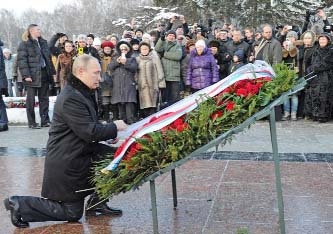
AFP, Saint Petersburg :
President Vladimir Putin said Monday the memory of Russia’s heroism and sacrifice during World War II will endure as his country marked the 70th anniversary of the lifting of the Nazi siege of Leningrad.
Putin participated in commemorative ceremonies in his native Saint Petersburg, known as Leningrad under the Soviet Union, saying the world should never forget “the courage and heroism of the Soviet people and residents of Leningrad”.
The two-and-a-half-year assault is considered the most lethal siege in history, with German wartime commanders calculating that starvation was their most effective weapon against Leningrad’s inhabitants and defenders.
Putin met war veterans and survivors of the siege and laid flowers at memorials for the dead. “Three hundred and sixty thousand civilians died in Leningrad over a period of just four months from the end of 1941 to the start of 1942,” Putin told veterans.
“Britain lost nearly the same amount in the entire World War II. “Can you imagine the difference between the victims that the Soviet Union and other countries of the world laid on the altar of common victory?”
The 872-day siege by Nazi forces between September 1941 and January 1943 is seared into the national consciousness as one of the darkest moments in Russian history.
Taking Leningrad was a strategic part of Adolf Hitler’s ultimately failed plan to eliminate the Soviet Union as a threat to Nazi Germany’s domination of Europe.
On Monday, German President Joachim Gauck wrote to Putin to express Berlin’s “deep sadness and shame” at the siege, saying that Germany recognised its “historical responsibility for the suffering inflicted on the people of Leningrad”.

